Sustainable Development
at STELLENBOSCH UNIVERSITY
The Sustainable Development Agendas

Vision 2040 and [SU’s] Strategic Framework 2019–2024 was developed taking into account South Africa’s National Development Plan, the African Union’s Agenda 2063 and the United Nations’ Sustainable Development Goals. It bears testimony to SU’s commitment to being a university that is relevant to its context and is of service to our country and continent – an inclusive, world-class university in and for Africa.
Prof Wim de Villiers (Vision 2040)
The Sustainable Development Agendas
The UN’s 2030 Agenda and its SDGs as well as the AU’s Agenda 2063 Goals, were created as a common framework to address the most important social, economic, and environmental challenges currently facing the world. Years of good progress have been undone due to the worldwide Covid-19 health crisis; it was increasingly evident that the world-wide aim of attaining the combined SDGs set by the UN And AU would not be attained. The opportunity now arises for nations and institutions to re-evaluate their SDG progress and implement policies to help accelerate their progress in their National Development Plans (NDP) within their own contexts and priorities.
At Stellenbosch University, we highlight our contributions to both the UN’s 2030 Agenda and its SDGs, as well as the AU’s Agenda 2063.
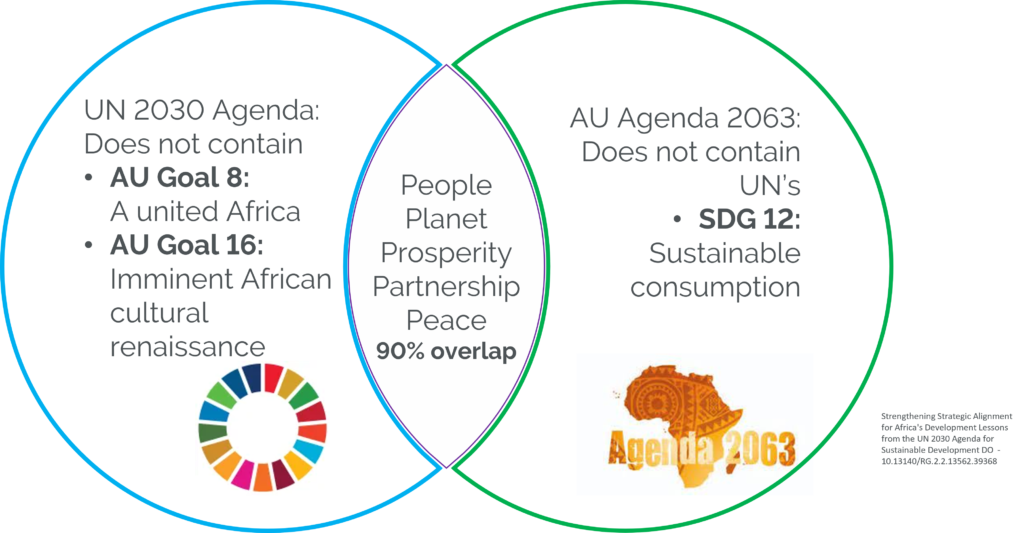
The level of similarity in focus areas and outcomes between the AU Agenda 2063 and the SDG 2030 Agenda is as high as 90 percent, predicting a high level of consistency between the desired outcomes and goals. The goals that are not explicitly mentioned in the SDG, are the AU’s Goals 8 (A United Africa) and 16 (African cultural renaissance is pre-eminent). On the other hand, SDG 12 (Ensure sustainable consumption and production patterns) is omitted in the AU Goals (United Nations Development Plan Africa, 2017 Both Agendas place a firm focus on People, Planet, Prosperity, Peace, and Partnership.
View the overlap
| SDG 1: No Poverty | Goal 1: A high standard of living, quality of life and well-being for all |
| SDG 2: Zero Hunger | Goal 5: Modern agriculture for increased productivity and production |
| SDG 3: Good Health and Well-being | Goal 3: Healthy and well-nourished citizens |
| SDG 4: Quality Education | Goal 2: Well-educated citizens and skills revolution underpinned by science, technology and innovation Goal 18: Engaged and empowered youth and children |
| SDG 5: Gender Equality | Goal 17: Full gender equality in all spheres of life |
| SDG 6: Clean Water and Sanitation | Goal 7: Environmentally sustainable climate resilient economies and communities |
| SDG 7: Affordable and Clean Energy | Goal 7: Environmentally sustainable climate resilient economies and communities |
| SDG 8: Decent Work and Economic Growth | Goal 4: Transformed economies and job creation |
| SDG 9: Industry, Innovation and Infrastructure | Goal 10: World-class infrastructure that crisscrosses Africa |
| SDG 10: Reduced Inequality | Goal 1: A high standard of living, quality of life and wellbeing for all |
| SDG 11: Sustainable Cities and Communities | Goal 10: World-class infrastructure that crisscrosses Africa |
| SDG 12: Responsible Consumption and Production | - |
| SDG 13: Climate Action | Goal 5: Environmentally sustainable climate resilient economies and communities Goal 6: Blue/ocean economy for accelerated economic growth |
| SDG 14: Life Below Water | Goal 5: Environmentally sustainable climate resilient economies and communities Goal 6: Blue/ocean economy for accelerated economic growth |
| SDG 15: Life on Land | Goal 5: Environmentally sustainable climate resilient economies and communities Goal 6: Blue/ocean economy for accelerated economic growth |
| SDG 16: Peace, Justice and Strong Institutions | Goal 11: Democratic values, practices, universal principles of human rights, justice and the rule of law entrenched Goal 12: Capable institutions and transformed leadership in place at all levels, cross-cutting with Governance Goal 13: Peace, security, and stability are preserved Goal 14: A stable and peaceful Africa Goal 15: A fully functional and operational African peace and security architecture |
| SDG 17: Partnerships to achieve the Goal | Goal 9: Key continental financial and monetary institutions established and functional Goal 19: Africa as a major partner in global affairs and peaceful co-existence Goal 20: Africa takes full responsibility for financing her development |
| - | Goal 8: United Africa (federal or confederate) |
| - | Goal 16: African Cultural Renaissance is pre-eminent |
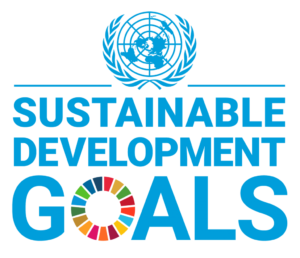
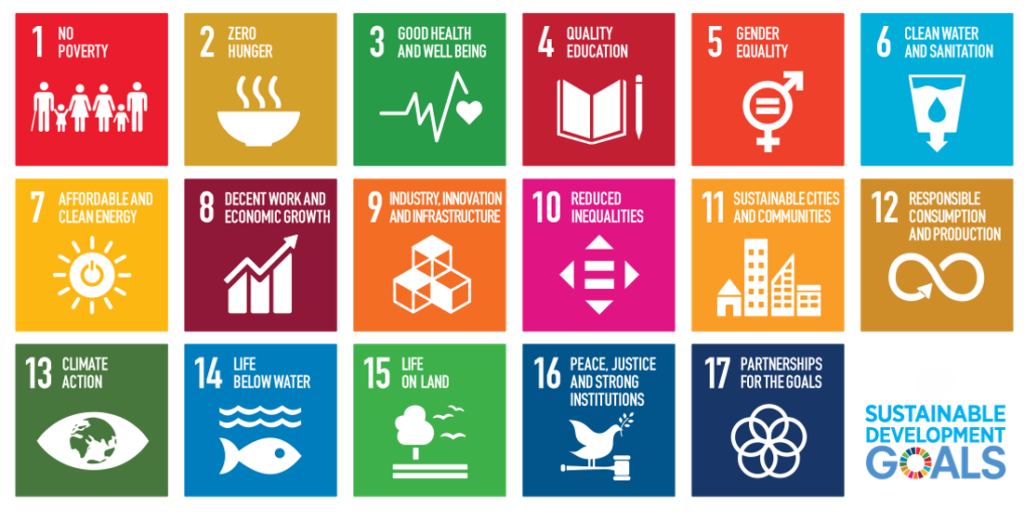
The UN's 2030 Agenda and its SDGs
Improving on the Millennium Development Goals (MDGs), set by the UN in 2000 for the alleviation of extreme poverty, 17 integrated goals – the Sustainable Development Goals (SDGs) – and 169 targets were adopted by all UN General Assembly member states in 2015 as part of their 2030 Agenda. This SDG Agenda addresses the three overarching sustainable development dimensions: economic, social, and environmental. The Agenda also calls for a reworking of the fundamentals of the worlds’ economies to insure just, inclusive and sustainable progress for everyone.
The 17 SDGs are universal and global in their application and require a global response. They are centred on six principal transformation areas: quality education for all, universal health coverage, clean energy and industry, sustainable agriculture and land use, sustainable urban infrastructure, and universal access to digital technologies.
While the MDGs were a partnership between developed and developing countries, and funding was supplied by the developed countries, all players will work together in an integrated and collaborative framework to reach the SDGs by 2030. As such, all stakeholders from the UN, national, regional, and local governments, the private sector, civil society, academia, and people at large need to work towards Sustainable Development. Universities with their knowledge and expertise, research, education resources, and mandates are no exception. Each of the Goals also come with a set of targets and indicators that can be found online.
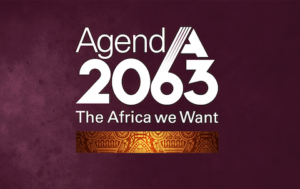
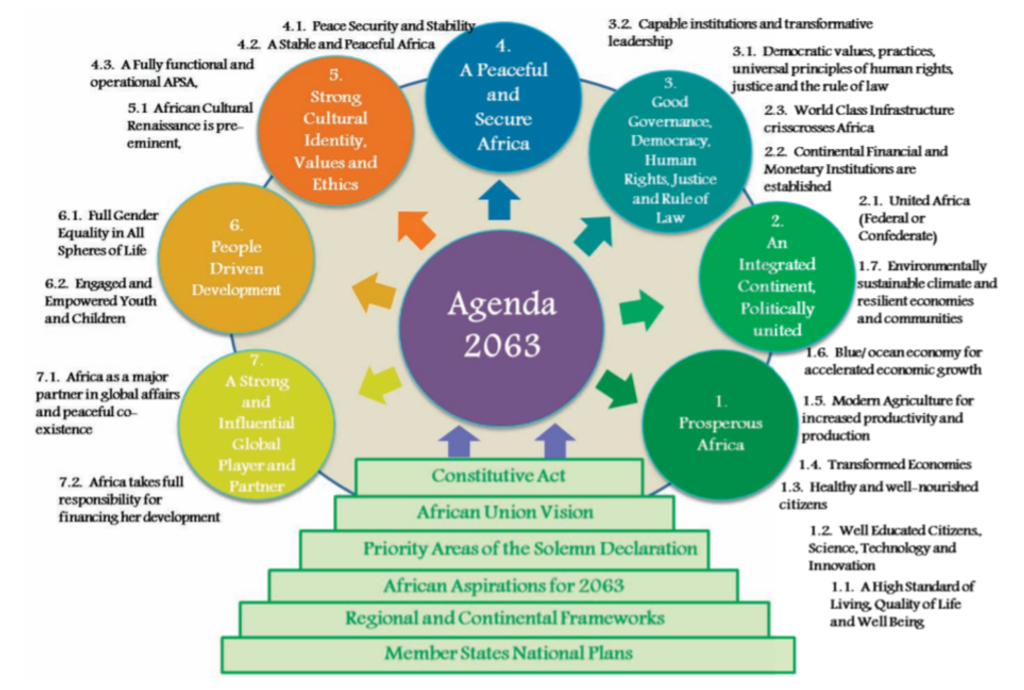
The AU's Agenda 2063 for a peaceful and prosperous Africa
In May 2013, two years before the adoption of the UN’s SDGs, the African Union set out the vision of what should be achieved for Africa in the next 50 years. This vision subsequently became Agenda 2063 for the Pan-African vision of “an integrated, prosperous and peaceful Africa, driven by its own citizens, representing a dynamic force in the international arena”. The Agenda is set into five 10-year plans, with the First Ten Year Implementation Plan (FTYIP) spanning from 2013 – 2023, to help the ideas of Agenda 2063 transform not only into action, but also tangible goals, targets, and measures.
There are seven aspirations with 20 specific Goals that outline and reflect a common stance for sustainable development and inclusive growth, shared freedom, harmony, wealth, health, and well-being, where women and children can prosper. The Goals with their aspirations can be found online.
In addition to the aspirations and their goals, the AU also developed continental frameworks in significant areas such as agriculture, trade, transport, energy, and mining, as mentioned in the First-Ten Year Implementation Plan. These key areas will contribute to the AU member nations reaching their development goals.
The alignment of Sustainable Development Goals and Agenda 2063
The UN mentions the AU’s Agenda 2063 in their 2030 Agenda declaration under the implementation section, alongside other strategies and programmes for action. In this section the UN explicitly states the importance of supporting the AU’s Agenda 2063 and the programme of the New Partnership for Africa’s Development (NEPAD).
As the AU Agenda 2063 was available before the UN Agenda was approved, it offered the opportunity to be recognised and included in the UN SDGs. Agenda 2063 forms an integral part of the UN’s Agenda, while Africa’s specific sustainable development challenges are noted. The UN furthermore notes the challenges that countries in conflict and post-conflict situations face when trying to achieve not only peace, but also sustainable development.
Both the AU’s Agenda 2063 and the UN’s 2030 Agenda focus on people influencing the sustainable development that is needed. The focus of these programmes is to promote social, economic and environmental sustainability, while “strengthening the partnerships, joint projects and accelerating the outcomes in Africa”.




